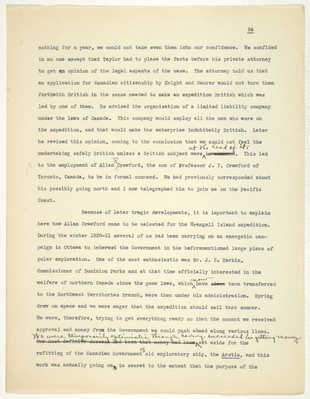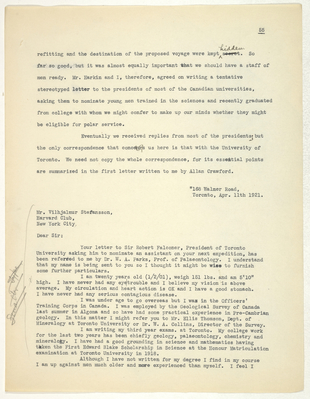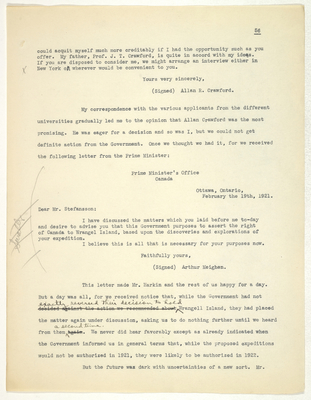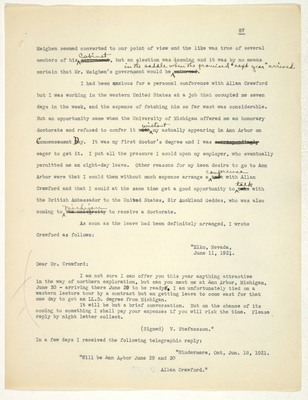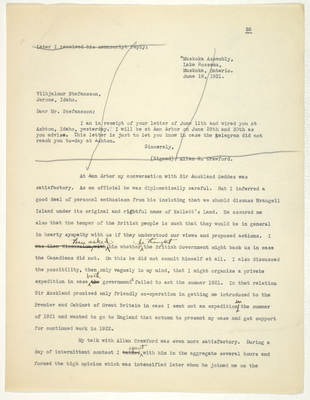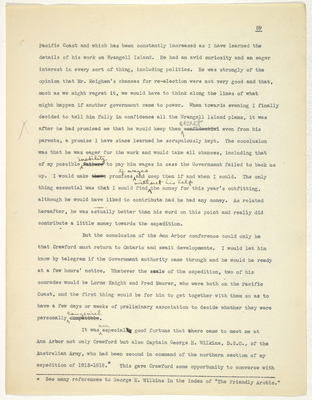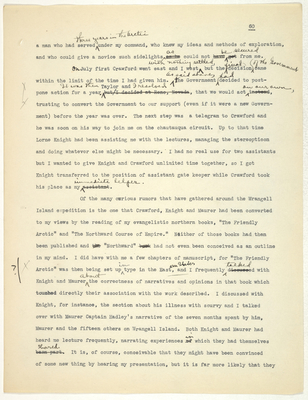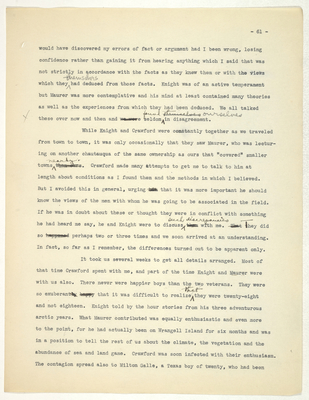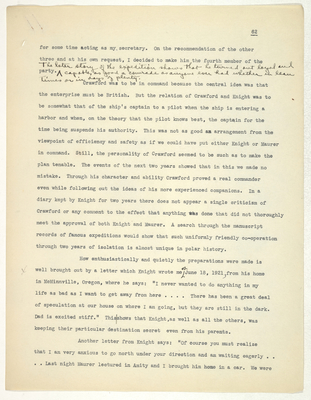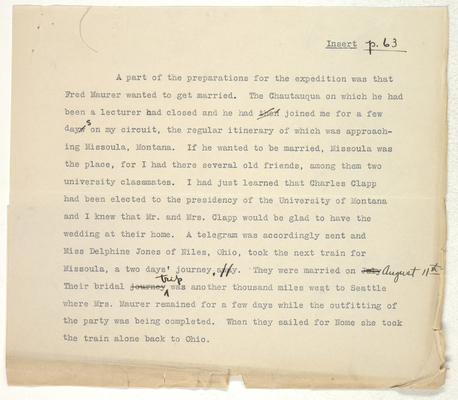Pages That Need Review
stefansson-wrangel-09-27
stefansson-wrangel-09-27-009
54
nothing for a year, we could not take even them into our confidence. We confided in no one except that Taylor had to place the facts before his private attorney to get qn opinion of the legal aspects of the case. The attorney told us that an application for Canadian citizenship by Knight and Maurer would not turn them forthwith British in the sense needed to make an expedition British which was led by one of them. He advised the organization of a limited liability company under the laws of Canada. This company would employ all the men who were on the expedition, and that would make the enterprise indubitably British. Later he revised this opinion, coming to the conclusion that we could not feel the undertaking safely British unless a British subject were at the head of it.in command. This led to the employment of Allan R Crawford, the son of Professor J. T. Crawford of Toronto, Canada, to be in formal command. We had previously corresponded about his possibly going north and I now telegraphed him to join me on the Pacific Coast.
Because of later tragic developments, it is important to explain here how Allan Crawford came to be selected for the Wrangell Island expedition. During the winter 1920-21 several of us had been carrying on an energetic campaign in Ottawa to interest the Government in the beforementioned large plans of polar exploration. One of the most enthusiastic was Mr. J. B. Harkin, Commissioner of Dominion Parks and at that time officially interested in the welfare of northern Canada since the game laws, which now havesince been transferred to the Northwest Territories Branch, were then under his administration. Spring drew on apace and we were eager that the expedition should sail that summer. We were, therefore, trying to get everything ready so that the moment we received approval and money from the Government we could push ahead along various lines. Our most definite success had been that money had beenWe were temporarily optimistic through having succeeded in getting money set aside for the refitting of the Canadian Government's old exploratory ship, the Arctic, and this work was actually going on in secret to the extent that the purpose of the
stefansson-wrangel-09-27-010
55
refitting and the destination of the proposed voyage were kept hiddensecret. So far so good, but it was almost equally important that we should have a staff of men ready, Mr. Harkin and I, therefore, agreed on writing a tentative stereotyped letter to the presidents of most of the Canadian universities, asking them to nominate young men trained in the sciences and recently graduated from college with whom we might confer to make up our minds whether they might be eligible for polar service.
Eventually we received replies from most of the presidents; but the only correspondence that concerns us here is that with the University of Toronto. We need not copy the whole correspondence, for its essential points are summarized in the first letter written to me by Allan Crawford.
"168 Walmer Road, Toronto, Apr. 11th 1921.
Mr. Vilhjalmur Stefansson, Harvard Club, New York City,
Dear Sir:
Your letter to Sir Robert Falconer, President of Toronto University asking him to nominate an assistant on your next expedition, has been referred to me by Dr. W. A. Parks, Prof, of Palaeontology. I understand that my name is being sent to you so I thought it might be wise to furnish some further particulars.
I am twenty years old (l/2/01), weigh 151 lbs. and am 5'10" high. I have never had any eye trouble and I believe my vision is above average. My circulation and heart action is OK and I have a good stomach. I have never had any serious contagious disease.
I was under age to go overseas but I was in the Officers’ Training Corps in Canada. I was employed by the Geological Survey of Canada last summer in Algoma and so have had some practical experience in Pre-Cambrian geology. In this matter I might refer you to Mr. Ellis Thomson, Dept. of Mineralogy at Toronto University or Dr. W. A. Collins, Director of the Survey.
I am writing my third year exams. at Toronto. My college work for the last two years has been chiefly geology, palaeontology, chemistry and mineralogy. I have had a good grounding in science and mathematics having taken the First Edward Blake Scholarship in Science at the Honour Matriculation examination at Toronto University in 1918.
Although I have not written for my degree I find in my course I am up against men much older and more experienced than myself. I feel I
stefansson-wrangel-09-27-011
56
could acquit myself much more creditably if I had the opportunity such as you offer. My father. Prof. J. T. Crawford, is quite in accord with my ideas. If you are disposed to consider me, we might arrange an interview either in New York or wherever would be convenient to you.
Yours very sincerely,
(Signed) Allan R. Crawford.
My correspondence with the various applicants from the different universities gradually led me to the opinion that Allan Crawford was the most promising. He was eager for a decision and so was I, but we could not get definite action from the Government. Once we thought we had it, for we received the following letter from the Prime Minister:
Prime Minister's Office
February the 19th, 1921.
Dear Mr. Stefansson:
I have discussed the matters which you laid before me to-day and desire to advise you that this Government purposes to assert the right of Canada to Wrangel Island, based upon the discoveries and explorations of your expedition.
I believe this is all that is necessary for your purposes now.
Faithfully yours,
(Signed) Arthur Meighen.
This letter made Mr. Harkin and the rest of us happy for a day. But a day was all, for we received notice that, while the Government had not exactly reversed their decision to hold Wrangell Island, they had placed the matter again under discussion, asking us to do nothing further until we heard from them a second time. We never did hear favorably except as already indicated when the Government informed us in general terms that, while the proposed expeditions would not be authorized in 1921, they were likely to be authorized in 1922.
But the future was dark with uncertainties of a new sort. Mr.
stefansson-wrangel-09-27-012
57
Meighen seemed converted to our point of view and the like was true of several members of his government cabinet, but an election was looming and it was by no means certain that Mr. Meighen’s government would be in the saddle when the promised "next year" arrived.returned.
I had been anxious for a personal conference with Allan Crawford but I was working in the western United States at a job that occupied me seven days in the week, and the expense of fetching him so far west was considerable. But an opportunity came when the University of Michigan offered me an honorary doctorate and refused to confer it with without my actually appearing in Ann Arbor on Commencement Day. It was my first doctor's degree and I was correspondingly eager to get it. I put all the pressure I could upon my employer, who eventually permitted me an eight-day leave. Other reasons for my keen desire to go to Ann Arbor were that I could then without much expense arrange a talk conference with Allan Crawford and that I could at the same time get a good opportunity to take talk with the British Ambassador to the United States, Sir Auckland Geddes, who was also coming to the university Michigan to receive a doctorate.
As soon as the leave had been definitely arranged, I wrote Crawford as follows:
"Elko, Nevada, June 11, 1921.
Dear Mr. Crawford:
I am not sure I can offer you this year anything attractive in the way of northern exploration, but can you meet me at Ann Arbor, Michigan, June 30 - arriving there June 29 to be ready?. I am unfortunately tied on a western lecture tour by a contract but am getting leave to come east for that one day to get an LL.D. degree from Michigan.
It will be but a brief conversation. But on the chance of its coming to something I shall pay your expenses if you will risk the time. Please reply by night letter collect.
(Signed) V. Stefansson."
In a few days I received the following telegraphic reply:
"Windermere, Ont, Jun. 18, 1921.
"Will be Ann Arbor June 29 and 30
Allan Crawford."
stefansson-wrangel-09-27-013
58
Later I received his manuscript reply:
"Muskoka Assembly, Lake Rosseau, Muskoka, Ontario. June 19,/1921.
Vilhjalmur Stefansson, Jerome, Idaho. Dear Mr. Stefansson:
I am in receipt of your letter of June 11th and wired you at Ashton, Idaho, yesterday. I will be at Ann Arbor on June 29th and 30th as you advise. This letter is just to let you know in case the telegram did not reach you to-day at Ashton.
Sincerely, (Signed) Allan R. Crawford
At Ann Arbor my conversation with Sir Auckland Geddes was satisfactory. As an official he was diplomatically careful. But I inferred a good deal of personal enthusiasm from his insisting that we should discuss Wrangell Island under its original and rightful name of Kellett’s Land. He assured me also that the temper of the British people is such that they would be in general in hearty sympathy with us if they understood our views and proposed actions. I was then discussion with then asked him whether he thought the British Government might back us in case the Canadians did not. On this he did not commit himself at all. I also discussed the possibility, then only vaguely in my mind, that I might organize a private expedition in case the both governments failed to act the summer 1921. In that relation Sir Auckland promised only friendly co-operation in getting me introduced to the Premier and Cabinet of Great Britain in case I sent out an expedition in the summer of 1921 and wanted to go to England that autumn to present my case and get support for continued work in 1922.
My talk with Allan Crawford was even more satisfactory. During a day of intermittent contact I talked spent with him in the aggregate several hours and formed the high opinion which was intensified later when he joined me on the
stefansson-wrangel-09-27-014
59
Pacific Coast and which has been constantly increased as I have learned the details of his work on Wrangell Island. He had an avid curiosity and an eager interest in every sort of thing, including politics. He was strongly of the opinion that Mr. Meighen's chances for re-election were not very good and that, much as we might regret it, we would have to think along the lines of what might happen if another government came to power. When towards evening I finally decided to tell him fully in confidence all the Wrangell Island plans, it was after he had promised me that he would keep them confidential secret even from his parents, a promise I have since learned he scrupulously kept. The conclusion was that he was eager for the work and would take all chances, including that of my possible failure inability to pay him wages in case the Government failed to back us up. I would make these promises of wages and keep them if and when I could. The only thing essential was that I would find without his help the money for this year's outfitting. although he would have liked to contribute had he had any money. As related hereafter, he was actually better than his word on this point and really did contribute a little money towards the expedition.
But the conclusion of the Ann Arbor conference could only be that Crawford must return to Ontario and await developments. I would let him know by telegram if the Government authority came through and he would be ready at a few hours' notice. Whatever the scale of the expedition, two of his comrades would be Lome Knight and Fred Maurer, who were both on the Pacific Coast, and the first thing would be for him to get together with them so as to have a few days or weeks of preliminary association to decide whether they were personally compatible congenial.
It was an esspecially good fortune that there came to meet me at Ann Arbor not only Crawford but also Captain George H. Wilkins, D.S.O., of the Australian Army, who had been second in command of the northern section of my expedition of 1913-1918.* This gave Crawford some opportunity to converse with
*See many references to George H. Wilkins in the index of "The Friendly Arctic."
stefansson-wrangel-09-27-015
60
a man who had served three years in the Arctic under my command, who knew my ideas and methods of exploration, and who could give a novice such sidelights as he as could not have be secured get from me.
On July first Crawford went east and I west with nothing settled, but the final decision of the Government came within the limit of the time I had given him. As said above, The Government had decided to postpone action for a year. It was then Taylor and I resolved, but I decided at Reno, Nevadathat we would act on our own, trusting to convert the Government to our support (even if it were a new Government) before the year was over. The next step was a telegram to Crawford and he was soon on his way to join me on the chautauqua circuit. Up to that time Lome Knight had been assisting me with the lectures, managing the stereopticon and doing whatever else might be necessary. I had no real use for two assistants but I wanted to give Knight and Crawford unlimited time together, so I got Knight transferred to the position of assistant gate keeper while Crawford took his place as my assistant immediate helper.
Of the many curious rumors that have gathered around the Wrangell Island expedition is the one that Crawford, Knight and Maurer had been converted to my views by the reading of my evangelistic northern books, "The Friendly Arctic" and "The Northward Course of Empire." Neither of those books had then been published and the "Northward" book had not even been conceived as an outline in my mind. I did have with me a few chapters of manuscript, for "The Friendly Arctic was then being set up in type in the Eastern States, and I frequently discussed talked with Knight and Maurer about the correctness of narratives and opinions in that book which touched directly their association with the work described. I discussed with Knight, for instance, the section about his illness with scurvy and I talked over with Maurer Captain Hadley's narrative of the seven months spent by him, Maurer and the fifteen others on Wrangell Island. Both Knight and Maurer had heard me lecture frequently, narrating experience of in which they had themselves been part. shared. It is, of course, conceivable that they might have been convinced that they might have been convinced of some new thing by hearing my presentation, but it is far more likely that they
stefansson-wrangel-09-27-016
-61-
would have discovered my errors of fact or argument had I been wrong, losing confidence rather than gaining it from hearing anything which I said that was not strictly in accordance with the facts as they knew them or with the views which they themselves had deduced from those facts. Knight was of an active temperament but Maurer was more contemplative and his mind at least contained many theories as well as the experiences from which they had been deduced. We all talked these over now and then and we were seldom found themselves ourselves in disagreement.
While Knight and Crawford were constantly together as we traveled from town to town, it was only occasionally that they saw Maurer, who was lecturing on another chautauqua of the same ownership as ours that "covered" smaller towns nearby than ours. Crawford made many attempts to get me to talk to him at length about conditions as I found them and the methods in which I believed. But I avoided this in general, urging him that it was more important he should know the views of the men with whom he was going to be associated in the field. If he was in doubt about these or thought they were in conflict with something he had heard me say, he and Knight were to discuss such discrepanciesthem with me. That They did so happened perhaps two or three times and we soon arrived at an understanding. In fact, so far as I remember, the differences turned out to be apparent only.
It took us several weeks to get all details arranged. Most of that time Crawford spent with me, and part of the time Knight and Maurer were with us also. There never were happier boys than the two veterans. They were so exuberantly happy that it was difficult to realize that they were twenty-eight and not eighteen. Knight told by the hour stories from his three adventurous arctic years. What Maurer contributed was equally enthusiastic and even more to the point, for he had actually been on Wrangell Island for six months and was in a position to tell the rest of us about the climate, the vegetation and the abundance of sea and land game. Crawford was soon infected with their enthusiasm. The contagion spread also to Milton Galle, a Texas boy of twenty, who had been
stefansson-wrangel-09-27-017
62
for some time acting as my secretary. On the recommendation of the other three and at his own request, I decided to make him the fourth member of the party. The later story of the expedition shows that he turned out loyal and capable, as good a comrade as anyone ever had whether in lean times or in days of plenty.
Crawford was to be in command because the central idea was that the enterprise must be British. But the relation of Crawford and Knight was to be somewhat that of the ship's captain to a pilot when the ship is entering a harbor and when, on the theory that the pilot knows best, the captain for the time being suspends his authority. This was not as good an arrangement from the viewpoint of efficiency and safety as if we could have put either Knight or Maurer in command. Still, the personality of Crawford seemed to be such as to make the plan tenable. The events of the next two years showed that in this made no mistake. Through his character and ability Crawford proved a real commander even while following out the ideas of his more experienced companions. In a diary kept by Knight for two years there does not appear a single criticism of Crawford or any comment to the effect that anything was done that did not thoroughly meet the approval of both Knight and Maurer. A search through the manuscript records of famous expeditions would show that such uniformly friendly co-operation through two years of isolation is almost unique in polar history.
How enthusiastically and quietly the preparations were made is well brought out by a letter which Knight wrote me on , from his home in McMinnville, Oregon, where he says: "I never wanted to do anything in my life as bad as I want to get away from here .... There has been a great deal of speculation at our house on where I am going, but they are still in the dark. Dad is excited stiff." This shows that Knight, as well as all the others, was keeping their particular destination secret even from his parents.
Another letter from Knight says: "of course you must realize that I am very anxious to go north under your direction and am waiting eagerly . . . . Last night Maurer lectured in Amity and I brought him home in a car. We were
stefansson-wrangel-09-27-018
Insert p. 63
A part of the preparations for the expedition was that Fred Maurer wanted to get married. The Chautauqua on which he had been a lecturer had closed and he had then joined me for a few dayws on my circuit, the regular itinerary of which was approaching Missoula, Montana. If he wanted to he married, Missoula was the place, for I had there several old friends, among them two university classmates. I had just learned that Charles Clapp had been elected to the presidency of the University of Montana and I knew that Mr. and Mrs. Clapp would be glad to have the wedding at their home. A telegram was accordingly sent and Miss Delphine Jones of Niles, Ohio, took the next train for Missoula, a two days’ journey away. They were married on august 11th Their bridal journey trip was another thousand miles west to Seattle where Mrs. Maurer remained for a few days while the outfitting of the party was being completed. When they sailed for Nome she took the train alone back to Ohio.
